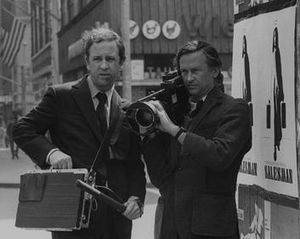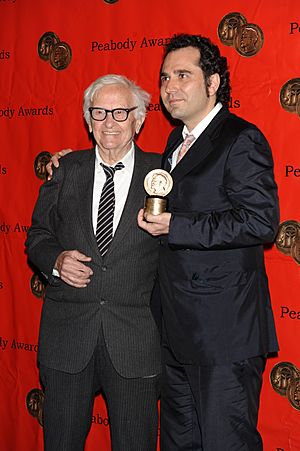Albert and David Maysles facts for kids
Quick facts for kids
Albert and David Maysles
|
|
|---|---|

David (left) and Albert Maysles c. 1968
|
|
| Born | Albert November 26, 1926 David January 10, 1931 Boston, Massachusetts, U.S.
|
| Died | David January 3, 1987 (aged 55), New York City, U.S. Albert March 5, 2015 (aged 88), New York City |
| Other names | The Maysles Brothers |
| Occupation | Film directors, producers |
| Years active | Albert (1955–2015; his death) David (1955–1987; his death) |
| Style | Documentary, Direct Cinema |
Albert Maysles (born November 26, 1926 – died March 5, 2015) and his brother David Maysles (born January 10, 1931 – died January 3, 1987) were American filmmakers. They were famous for making documentary films. Their style was called Direct Cinema, which meant they filmed real life as it happened. Some of their best-known films are Salesman (1969), Gimme Shelter (1970), and Grey Gardens (1975).
Contents
Who Were Albert and David Maysles?
Their Early Lives and Start in Film
The Maysles brothers grew up in Boston, Massachusetts. Their parents were immigrants from Ukraine and Poland. Their father worked for the post office, and their mother was a schoolteacher.
Albert first studied psychology in college. He served in the U.S. Army during World War II. After that, he taught psychology at Boston University. He also worked as a researcher in hospitals. His research led him to travel to Russia. There, he filmed his first documentary, Psychiatry in Russia (1955).
David also studied psychology at Boston University. He served in the U.S. Army in West Germany. In the mid-1950s, he worked in Hollywood. He helped make films like Bus Stop with Marilyn Monroe. David soon felt that regular filmmaking was boring. He wanted to film real life instead.
By 1957, David joined Albert to make documentaries. They filmed Youth in Poland together. In 1960, they joined a documentary company called Drew Associates. Albert filmed, and David recorded the sound. They worked on important films like Primary. In 1962, they started their own company, Maysles Films, Inc.
Making Movies Together: The Maysles Brothers' Films
The Maysles brothers made over 30 films together. They are most famous for three documentaries from the late 1960s and early 1970s. These films showed their unique style of filmmaking.
Famous Films: Salesman, Gimme Shelter, and Grey Gardens
Salesman (1969) follows a group of door-to-door Bible salesmen. It shows their daily lives and struggles. The film gives a close look at ordinary people.
Gimme Shelter (1970) is about the band The Rolling Stones. It shows their 1969 U.S. tour. The film ends with a concert that had an unexpected, sad event.
Grey Gardens (1975) tells the story of a mother and daughter. They were relatives of Jacqueline Kennedy Onassis. They lived in a rundown mansion in New York. The film shows their unusual lives.
Their Unique Filmmaking Style: Direct Cinema
The Maysles brothers' films are examples of Direct Cinema. This style means they let the story happen naturally. They did not plan what to shoot. Albert Maysles once said, "Remember, as a documentarian you are an observer, an author but not a director."
However, some people criticized their films. They thought the brothers might have planned some scenes. For example, some wondered if parts of Gimme Shelter or Salesman were staged. Others felt they might have taken advantage of the people in Grey Gardens. The Maysles brothers always said their films were true to life.
Documenting Artists and Musicians
Many of the Maysles' documentaries focused on art, artists, and musicians. They filmed The Beatles' first visit to the U.S. in 1964. They also filmed Yoko Ono's "Cut Piece" art project in 1965.
They made several films about the artists Christo and Jeanne-Claude. These films showed Christo's large art projects. One of these films, Christo's Valley Curtain, was even nominated for an Academy Award. They also filmed famous people like Marlon Brando and Truman Capote.
Albert's Work After David's Death
David Maysles passed away in 1987. He was 55 years old. After David's death, Albert Maysles continued to make films on his own.
One of his important films was LaLee's Kin: The Legacy of Cotton (2001). This film showed the challenges of a poor family in the Mississippi Delta. It was nominated for an Academy Award. Albert also filmed The Love We Make (2011). This movie followed Paul McCartney in New York City after the September 11, 2001 attacks.
Albert continued to film Christo and Jeanne-Claude's art projects. He also helped film When We Were Kings. This documentary was about the famous boxing match between Muhammad Ali and George Foreman. In 2005, Albert started the Maysles Documentary Center in Harlem. It is a place for showing and making documentary films.
Albert Maysles died in 2015 at the age of 88. Two of his films, Iris and In Transit, were released after he passed away.
Their Impact on Documentary Films
The Maysles brothers changed how documentaries were made. They used a "fly on the wall" approach. This meant they filmed without interfering. They let real life unfold naturally. This style is a key part of Direct Cinema.
They did not use narration or extra music in their films. Instead, the story was told through the footage they chose. They also used special camera and sound equipment. Albert even built his own 16mm camera. He made it easy to hold on his shoulder. This allowed him to film smoothly without a tripod.
Their films Salesman and Grey Gardens are very important. They are kept in the Library of Congress' National Film Registry. This means they are considered culturally and historically significant. Many people, including other filmmakers, have praised the Maysles brothers' work.
Awards and Recognition
The Maysles brothers received many awards for their films.
- Their short film Christo's Valley Curtain was nominated for an Academy Award in 1973.
- Albert Maysles received a National Medal of Arts from President Barack Obama in 2014.
- Albert also won a Primetime Emmy for his film Soldiers of Music in 1991.
- David Maysles won a Primetime Emmy in 1985 for Vladimir Horowitz: The Last Romantic, along with Albert.
Films by the Maysles Brothers
- Youth in Poland (1957)
- Showman (1963) – about Joseph E. Levine
- Orson Welles in Spain (1963)
- What's Happening! The Beatles In The U.S.A. (1964) – about The Beatles
- IBM: A Self-Portrait (1964)
- Meet Marlon Brando (1965)
- Cut Piece (1965) – about Yoko Ono
- Store Front (1965) – about Christo and Jeanne-Claude
- With Love from Truman (1966) – about Truman Capote
- Salesman (1968)
- Gimme Shelter (1970) – about The Rolling Stones
- Christo's Valley Curtain (1974) – about Christo and Jeanne-Claude
- Grey Gardens (1975)
- "The Burks of Georgia" from Six American Families (1976)
- Running Fence (1978) – about Christo and Jeanne-Claude
- Muhammad and Larry (1980) – about Muhammad Ali and Larry Holmes
- Vladimir Horowitz: The Last Romantic (1985)
- Ozawa (1986)
- Islands (1986) – about Christo and Jeanne-Claude
- Christo in Paris (1990) – about Christo and Jeanne-Claude
Films by Albert Maysles
- Psychiatry in Russia (1955)
- Russian Close-Up (1957)
- Six in Paris (1965) – as a cameraman
- Monterey Pop (1968) – as a cameraman
- Horowitz Plays Mozart (1987)
- Jessye Norman Sings Carmen (1989)
- They Met in Japan (1989)
- Soldiers of Music: Rostropovich Returns to Russia (1991)
- Baroque Duet (1992)
- Accent on the Offbeat (1994)
- Umbrellas (1995) – about Christo and Jeanne-Claude
- Letting Go: A Hospice Journey (1996)
- When We Were Kings (1996) – as a cameraman
- Concert of Wills: Making the Getty Center (1997)
- LaLee's Kin: The Legacy of Cotton (2000)
- The Beales of Grey Gardens (2006) – unused footage from Grey Gardens
- The Gates (2007) – about Christo and Jeanne-Claude
- Sally Gross: The Pleasure of Stillness (2007)
- Close Up: Portraits (2008)
- Four Seasons Lodge (2008) – as a cameraman
- Rufus Wainwright: Milwaukee At Last (2009)
- Hollywood Renegade: The Life of Budd Schulberg (2009) – as a cameraman
- The Love We Make (2011)
- Iris (2014) – about Iris Apfel
- In Transit (2015)
See Also
- Direct Cinema
- Documentary film
 | Emma Amos |
 | Edward Mitchell Bannister |
 | Larry D. Alexander |
 | Ernie Barnes |


